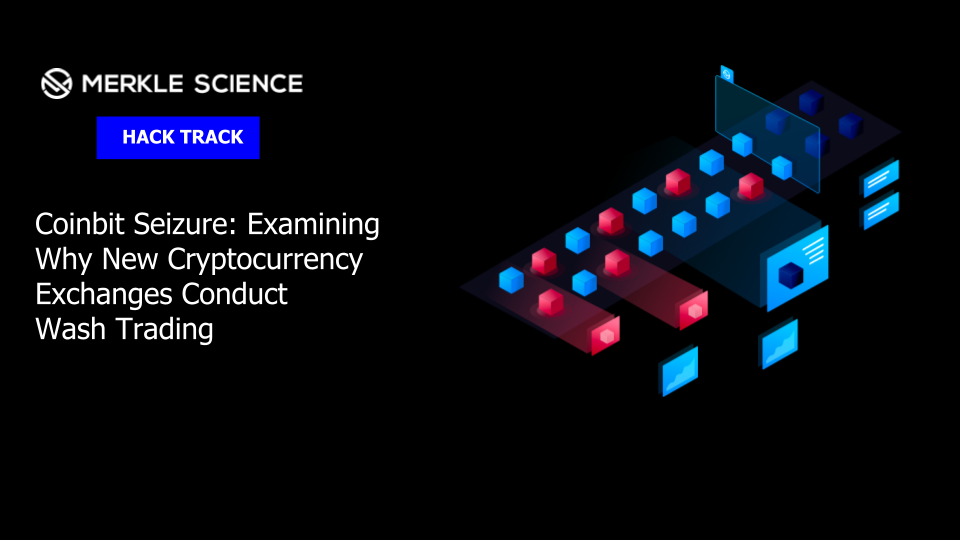Coinbit Seizure: Examining Why New Cryptocurrency Exchanges Conduct Wash Trading

Merkle Science

On August 26th, the South Korean newspaper Seoul Shinmun published a report stating that 99% of transaction volume was faked through wash trading on Coinbit, one of the largest cryptocurrency exchanges in South Korea, between August 2019 to May 2020. Though the exchange is now seized by police under allegations of fraud, this is not the first instance in which a cryptocurrency exchange is accused of wash trading.
In March 2019, Bitwise Asset Management told the U.S Securities and Exchange Commission (SEC) in its presentation that 95% of bitcoin trading volume globally is fake and/or non-economic in nature. In fact, the largest crypto exchange from South Korea, Upbit, has also been under scrutiny for wash trading after its officials were indicted for fraud in late 2018. This article will examine why exchanges conduct wash trading and analyze the Coinbit wash trading fiasco in detail.
What Is Wash Trading and Why Do Cryptocurrency Exchanges Enable It?
Wash trading of cryptocurrency is a process in which an exchange trades with itself in order to create an appearance of greater liquidity or manipulate the value of the assets being traded. Cryptocurrency exchanges have strong economic incentives to inflate trading volumes and manipulate market prices. As most cryptocurrency exchanges generate profit by charging transaction fees, trading volume is crucial for attracting traders to the exchange and increasing market share. Third-party market data platforms, such as CoinMarketCap, CryptoCompare, and CoinGecko, rely on the trading data provided by exchanges to determine each platform’s market share which is used by prospective traders to assess which exchanges to use.
Wash trading enables newly formed exchanges to gain a large market share within a few months and this has become a lucrative shortcut to marketing success for many young exchanges. For example, in the case of Coinbit, the exchange is accused of using multiple “ghost accounts” to inflate trading volume. According to estimates, up to 99% of Coinbit’s trading volume is said to have been manipulated between August 2019 to May 2020, which resulted in “unfair profits” of about US$84 million equivalent.
What Do We Know About Coinbit Wash Trading So Far
To investigate CoinBit’s wash trading in detail, Merkle Science’s data science team looked into the deposits and withdrawals of Coinbit’s known cryptocurrency addresses during the period August 2019 to May 2020. Following is what we found:
Total deposits in Bitcoin = 2964.67
Total deposits in USD = 24,637,718
Total withdrawals in Bitcoin = 3248.48
Total deposits in USD = 27,600,786
Total withdrawal/deposits in Bitcoin: 6213.15
Total withdrawal/deposits in USD: 52,238,504
As the above data outlines, total deposits and withdrawals on the exchange from August 2019 to May 2020 were a little over USD 52 million and most of the deposits and withdrawals were from “unidentified sources.” However, wash trading helped Coinbit make a profit of USD 84 million during this period.
It is important to note here that the Seoul Shinmun report also highlights the role of “ghost accounts.” According to the report, the police said that Coinbit owner Choi Mo and the management team inflated the transaction volume and manipulated the market price by buying and selling coins between accounts inside the exchange through multiple ghost accounts.
Conclusion
As cases of wash trading on cryptocurrency exchanges are rising, it is important to acknowledge the lack of continuous monitoring of cryptocurrency transactions on exchanges that need to be fixed. Along with tougher regulations and cooperation between industry stakeholders, continuous monitoring of transactions on exchanges and VASPs is needed of the hour as it will not only help in preventing wash trading but also help detect money laundering, terrorism financing, and other illicit trade through cryptocurrencies. For example, a transaction monitoring solution, such as Merkle Science, could have helped track the wash trading attempts of Coinbit long before it was flagged by an insider to Seoul Shinmun.
If you would like to learn more about cryptocurrency compliance, get in touch with us at contact@merklescience.com.


